
YES THEY CAN: The Meaning of Podemos
15.01.2016
Sanjiv Sachdev reports for Philosophy Football on a recent seminar about the meaning and significance of Podemos
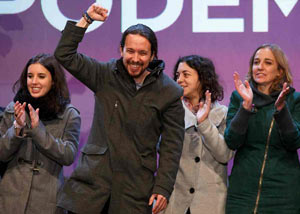 In December’s Spanish General Election, Podemos (‘We Can’ in English), led by the charismatic Pablo Iglesias, emerged as the only clear cut winner. It did much better than the polls had predicted, securing 69 of the 350 seats in parliament (the Conservative Partido Popular won 123, the Socialist PSOE 90). Its share of the vote was just below that of the Socialists (21 per cent versus 22) - a remarkable achievement for a party that only formed in January 2014. Sociologist Carlos Delclos is based in Barcelona, at the seminar he explained Podemos has gone, in two years, from fifty people protesting in a plaza to 69 seats in parliament.
In December’s Spanish General Election, Podemos (‘We Can’ in English), led by the charismatic Pablo Iglesias, emerged as the only clear cut winner. It did much better than the polls had predicted, securing 69 of the 350 seats in parliament (the Conservative Partido Popular won 123, the Socialist PSOE 90). Its share of the vote was just below that of the Socialists (21 per cent versus 22) - a remarkable achievement for a party that only formed in January 2014. Sociologist Carlos Delclos is based in Barcelona, at the seminar he explained Podemos has gone, in two years, from fifty people protesting in a plaza to 69 seats in parliament.
Like Syriza, Podemos has given organisational form to a new European left-wing populism (what it calls ‘la nueva politica’). The PSOE has been seriously damaged by its role in implementing cuts and by corruption scandals. There has been a dramatic reconfiguration of Spanish politics, which remains in a state of febrile flux.
Podemos defines itself as a party, an electoral machine and a movement. Paul Kennedy, an academic specialising in modern Spanish politics joined the discussion to identify the roots of Podemos. Agreeing with Carlos he located these in the huge 2011 Indignados protests against Spain’s political system in the wake of financial crisis of 2008. The crisis left a quarter of Spanish families living below the poverty line; 400,000 families were evicted over the next few years while three million home lay empty. Unemployment rose above 26 per cent and above 60 per cent for the young. Deep cuts have been made to public spending and public sector jobs and it has been made much easier to sack workers. Moreover, corruption scandals have scarred political debate (even the Monarchy has fallen foul of this in the courts). Podemos emerged to challenge what it calls ‘la casta’ – the political and business elites (political recall is key demand of the party).
Key actors of Podemos came from a group of politics lecturers at Madrid’s Complutense University – including Iglesias - who sought to channel the energy of the Indignados, devising a strategy based on people versus ‘la casta’. Starting with an amateur TV discussion programme, ‘La Tuerka’ (and later ‘Fort Apache’), it built up a substantial on line presence, seeking to challenge and change conventional political debate and reach new audiences. Podemos sought to go beyond class to wider appeals embodied in the slogan: ‘We are neither left nor right. We are the people of the bottom going for people at the top’. The desire to win elections – and the realpolitik required to this end, has also been a key component of its approach.
Strategic alliances with Basque, Catalan and Galician nationalists also contributed to its success, going into the election as four groups (a outstanding issue is whether they will remain as four groups in the new parliament) but the issue of Catalan independence is potentially difficult one for Podemos (it supports a referendum on independence but opposes independence) and a potential stumbling block to forming a non-PP government.
Developing Gramsican concepts, the writings of Ernesto Laclau and Chantal Mouffe are hugely influential in Podemos thinking. The ideas of hegemony, sovereignty, multitude, radical democracy (the desire for ‘real democracy’ was a key component of the Indignados critique) and populism are widely used. The notion that identities are constructed and not an objective reality is a cornerstone of their thought.
It is a politics of emancipation, with a focus on a broader, more inclusive category of ‘people’ rather than ‘class’ as a category of emancipation. New concepts such as ‘revolving door’, the ‘Berlusconisation' of politics, the 'Bunker' (to describe the two main parties), have been deftly deployed by Podemos to shift the terms of political debate.
‘Radical democracy’ includes challenging supra-national notions of power that do not benefit democracy. Spanish sovereignty is seen as having been usurped by the forces of global capital (represented by the Troika) with cooperation of the country’s elites. Sirio Canos from Podemos GB and recent speaker at Philosophy Football’s ‘Scroogeonomics’ event cited at the seminar as an example the constitutional change enacted in 2011 by the PSOE and PP that made it a legal requirement for Spain’s governing party to designate balancing the budget a priority over public spending and investment. Reclaiming sovereignty is now a key objective for Podemos.
Spanish politics has a history of institutional experiment. Podemos began as an innovative blend of social media and grassroots politics. Internal democracy has been one of the key innovations of Podemos – although its scope and success is both debated and contested. The party has set up assembly-style ‘circulos’ or circles, a network of groups convened online or in person, defined either by geography or by area of interest or identity (science, sport, LBGT etc) to inform debate and policy development – one of the panel contended that most of the circles have become zeros, being mostly discarded in day-to-day practice (some prominent exceptions – such as sectional and international circles - were also identified).
Digital technology has also been enthusiastically embraced and adroitly used as a means of campaigning and internal democracy, but so have conventional media such as television (one critic dubbed Podemos as ‘A Leninist media project’). An App has been devised to enable voting.
The political discourse in Spain has traditionally been very pro-European (this included the once influential Communist party). The economic and political benefits of EU membership are widely accepted. The actions of the Troika in Greece has tempered this enthusiasm, but Podemos remains broadly pro-European, arguing for a different type of Europe, not underpinned by neo-liberal norms. Moreover, Spain’s economic situation is different to that of Greece, in that its economic plight is not as grave and it is more central to the European economy than Greece.
The key conclusion of the seminar was that Podemos has opened a new political space, changing the political terms of debate in key areas – in the words of one of their slogans: ‘making what appears impossible, possible’. And the relevance outside Spain was startlingly obvious for the British Left too, issues such as the challenges represented by the bond market, winning amid a hostile media, maintaining and enhancing internal democracy, accommodating regional calls for greater autonomy or independence are salient for the UK as well as Spain.
Further reading: Pablo Iglesias Politics in a Time of Crisis: Podemos and the Future of Democracy in Europe, published by Verso
Top Ten Sports Books to Read in 2016
03.12.2016
Mark Perryman ofPhilosophy Football picks his favourite reads for the new sporting year
Football’s European Championships featuring England, Wales, Northern Ireland and the Republic, the Rio OIympics, the Fury vs Klitschko rematch and the Ryder Cup will undoubtedly dominate the 2016 sporting summer and autumn, while cycling’s World Track Cycling Championships coming to London in March will be a domestic highlight. But then every year has its customary roster of the Six Nations, Grand National and Epsom Derby, Wimbledon fortnight, Le Tour, Formula One’s Grand Prix circuit and the weekly soap opera that modern football has increasingly become. Love it, like it, loathe it, ignore it or hate it, sport is inescapable. Its enduring appeal for the enthusiasts is located in the unpredicatability of outcomes, and long may that remain in 2016.
 How to explain the social and cultural emergence of spectator sport as the pre-eminent global community it has become? The best single volume chronicle of its dominance is provided by Rob Steen’s quite extraordinary Floodlights and Touchlines, reissued in 2015 as a handy paperback edition.
How to explain the social and cultural emergence of spectator sport as the pre-eminent global community it has become? The best single volume chronicle of its dominance is provided by Rob Steen’s quite extraordinary Floodlights and Touchlines, reissued in 2015 as a handy paperback edition.
The Heyday of the Football Annual, compiled and written by Ian Preece and Doug Cheeseman, takes the reader back to an age when football wasn’t all things to all men (and some women) and more like simply a sport. The mix of illustrations and text captures wonderfully the process of change, mostly for the worst, in England, home of the Premier League monster, at least. For the superlatives in modern football we have to look to Germany. World Champions, cheap match tickets, no foreign-owned clubs, safe standing and drinking while you watch a game, what’s not to like? Das Reboot is Raphael Honigstein’s highly readable account of the national team’s recovery from the relative lows of early exits at World Cup ’98, Euro 2000 and Euro 2004 to reigning World Champions.
Few other sports can match cricket for the quality of writing it has inspired. There is something about a five-day test, complete with lengthy breaks for lunch and tea, the crucial role of the toss of a coin to choose who bats or bowls first , and of course the ever-present threat or saving grace of ‘rain stopped play’ that creates a sporting drama, and literature, quite unlike any other. Charlie Connelly’s fictionalised account Gilbert: The Last Years of WG Grace is a splendid addition to the genre, as he tells his own imaginary story of WG’s twilight innings. Witty, appreciative of the sport’s history, and highly original.
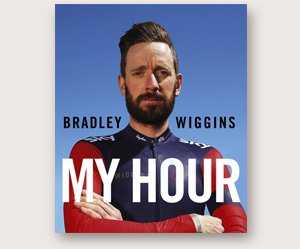 2012’s ‘Wiggomania’ was British cycling’s breakthrough moment and it has hardly looked back since. Bradley Wiggins is not only an incredibly gifted cyclist, but is also steeped in the traditions of cycling. His 2015 hour record as described in his new book My Hour was thus not only a world record but a tribute to all those who had gone before him to beat the clock. This beautifully produced book records in words and pictures the significance of both those ambitions. Neither Wiggins nor ‘the hour’ came out of nowhere. A much needed semi-social history of British cycling has finally been written and very good it is too. Kings of the Road by Robert Dineen records the sport’s early beginnings, the characters and events which framed its growth, and the most recent period of sparkling success and popularity.
2012’s ‘Wiggomania’ was British cycling’s breakthrough moment and it has hardly looked back since. Bradley Wiggins is not only an incredibly gifted cyclist, but is also steeped in the traditions of cycling. His 2015 hour record as described in his new book My Hour was thus not only a world record but a tribute to all those who had gone before him to beat the clock. This beautifully produced book records in words and pictures the significance of both those ambitions. Neither Wiggins nor ‘the hour’ came out of nowhere. A much needed semi-social history of British cycling has finally been written and very good it is too. Kings of the Road by Robert Dineen records the sport’s early beginnings, the characters and events which framed its growth, and the most recent period of sparkling success and popularity.
The recent Tyson Fury furore (sic) has reignited debates around the brutalised version of masculinity that boxing invariably frames. Though when this becomes immersed in the hapless non-entity of the BBC Sports Personality of the Year award, the issue becomes merely trivialised. Where does it say in the programme notes that the nomination is for only the ‘good’ personality? Donald McCrae has produced perhaps the finest retort to the acres of useless newsprint commentary on the subject with his new book A Man’s World telling the otherwise untold story of Emile Griffith, black World Welterweight boxing champion and gay man.
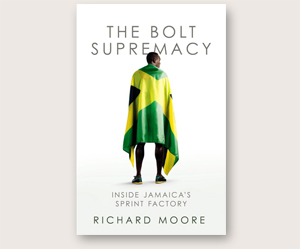 There was a period when World Heavyweight boxing champions – Ali, Frazier, Foreman, Tyson – were indisputably the most famous sports stars on the planet. Nowadays sporting culture is more diverse, fragmented and niched, so it isn’t so easy to nominate who would claim that mantle in 2016. The strongest contender however would surely be Usain Bolt. Richard Moore has written a string of superbly revelatory sports books, his latest The Bolt Supremacy investigates not only Bolt’s rise to become the world’s most famous sportsman, but also the athletics culture of Jamaica that produced him. A superb read ahead of Rio 2016.
There was a period when World Heavyweight boxing champions – Ali, Frazier, Foreman, Tyson – were indisputably the most famous sports stars on the planet. Nowadays sporting culture is more diverse, fragmented and niched, so it isn’t so easy to nominate who would claim that mantle in 2016. The strongest contender however would surely be Usain Bolt. Richard Moore has written a string of superbly revelatory sports books, his latest The Bolt Supremacy investigates not only Bolt’s rise to become the world’s most famous sportsman, but also the athletics culture of Jamaica that produced him. A superb read ahead of Rio 2016.
But the core appeal of sport is that it is, in principle at least, for everyone, not just the gold medal winners and world record-breakers. We can all take part. What we are embarking on when we cross that line from inactivity to activity is to engage with some kind of testing of our potential for endurance, strength or speed. Few however will ever reach the heights of ultra-runner Lizzy Hawker. Yet as she recalls in her book Runner there is an unbroken connection of experience and ambition between the novice jogger taking their first tentative steps on a New Year resolution run to get fit and her superlative achievement of running up and down mountains for 24-hours at a stretch.
 Which is how I ended up with my pick of the sports books to read in 2016. Hugh Hornby’s Bowled Over. The latest in the incredibly ambitious ‘Played in Britain’ publishing series, author Hugh Hornby explores a sport little known outside of its coterie of enthusiasts, bowling, yet absolutely woven into the fabric of English life . The history and changing culture of that connection tells us so much about both the intrinsic value of sport and the making of Englishness. A sport that barely features on the back pages, but with roots that rival, if not exceed, the money-fuelled TV extravaganza of football, rugby, cricket, formula one that fills the TV sporting schedules. Never mind the hype of the Premier League, Rio, Wimbledon and so on, Bowled Over is my number one book to help us understand the true meaning of sport in 2016.
Which is how I ended up with my pick of the sports books to read in 2016. Hugh Hornby’s Bowled Over. The latest in the incredibly ambitious ‘Played in Britain’ publishing series, author Hugh Hornby explores a sport little known outside of its coterie of enthusiasts, bowling, yet absolutely woven into the fabric of English life . The history and changing culture of that connection tells us so much about both the intrinsic value of sport and the making of Englishness. A sport that barely features on the back pages, but with roots that rival, if not exceed, the money-fuelled TV extravaganza of football, rugby, cricket, formula one that fills the TV sporting schedules. Never mind the hype of the Premier League, Rio, Wimbledon and so on, Bowled Over is my number one book to help us understand the true meaning of sport in 2016.
Note: No links in this review are to Amazon, if you can avoid purchasing from tax-dodgers please do so.
Mark Perryman is the co-founder of the self-styled ‘sporting outfitters of intellectual distinction’ akaPhilosophy Football. His book1966 and Not All That is published May 2016.
Scroogeonomics 2015
24.12.2015
A mean-spirited employer exploiting a low-wage economy to his own ends while undermining the human solidarity of families and communities. Charles Dickens' A Christmas Carol of 1843 sounds all too familiar on Christmas Eve 2015.
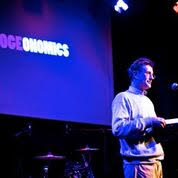 David Boyle , author of the excellent book How to Be English explains the enduring relevance of Scrooge.
David Boyle , author of the excellent book How to Be English explains the enduring relevance of Scrooge.
"The phrase “bah! humbug!” has long since passed into the English language, as a symbol of the mercantile approach to Christmas. It did so six days before Christmas in 1843, when Dickens published A Christmas Carol, at his own expense and single-handedly reinvented an English Christmas – with roast Turkey, families, presents, bonhomie and a very English kind of over-indulgence.
The title of Dickens’ book was deliberately chosen. It made the story sound mythic, ageless and reached back to the days when the English sang Christmas carols – and hastened the day when they would sing them again. But then, this may not have been Dickens’ main intention when he wrote the book, though he carried on writing annual Christmas stories until 1849, when he was too busy with writing the great slab of David Copperfield to have time. His main intention was to extract a little generosity of spirit from the English in their most mercantile of moods.
And if we ever doubt that change is possible, a quick re-read of A Christmas Carol can reassure us. There never was a transformation quite so instant as Scrooge’s, but Dickens takes him through a process which makes it possible for us to have the same experience, part memory, part shame, part exorcism. As it is, he seems to have succeeded in resurrecting Merrie England from the bare, dry bones of utilitarianism and as such deserves the last place in this book – in the hope that someone might repeat the trick again some day soon."
Danny Dorling is one of the country's leading experts on inequality. Philosophy Football commissioned Danny to provide an explanation of Scrooge 2015. Danny's text is combined with cartoons by Ella Furness, and music we also commissioned from Nia in a short film produced by Simon Green of Eventful. Danny explaines the causes and consequences of inequality and how, despite the intervening 172 years since A Christmas Carolwas published, because of low wages, rising personal debt - especially student debt - and lack of affordable housing, 2015 remains positively Dickensian for many.
For a small company Philosophy Football has big ambitions. When we set out on the idea of linking Christmas 2015 to Dickens' Scrooge of 1843 we not only commisioned music and ideas plus David Boyle's reading of his explanation of A Christmas Carol but also a poem by Matt Abbott.
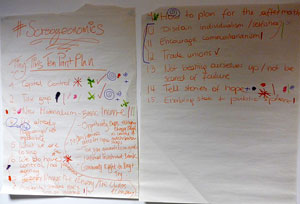
And in search of alternatives to Scroogenomics, Philosophy Football organised a seminar for a group of our customers and friends with Andrew Simms of the New Weather Institute who brought along a panel featuring the architect of 'Corbynomics', tax justice campaigner Richard Murphy, one of Jeremy Corbyn's economic advisers Ann Pettifor, and co-author of The New Materialism Ruth Potts. From their afternoon of duscussion they devised this 10-point alternative to Scroogeonomics.
- Capital Controls: the right wing in Britain campaign against membership of the European Union by appealing to fears over sovereignty and yet, ironically, they support a far greater threat to economic autonomy: unconstrained capital mobility. Step one in replacing Scroogeonomics is the ability to make finance a servant to the useful economy and not its master, subject to democratic checks and balances.
- Tackle the Tax Gap: the Government should publish and tackle the multi-billion tax gap – the difference between what companies and their wealthy owners should be paying and actually are. What’s missing is the glue that binds society together and pays for it’s needs and ambitions.
- Replace wasteful, unsatisfying and debt-fueled consumerism with a healthy relationship to the material world: good work in a green, circular economy in which we care for, share and repair goods can create a ‘new materialism’ that helps everyone have what they need and flourish within planetary boundaries.
- Better Economic Alternatives Already Exist: from banking to tax, investment, food, transport and energy the world is full of better policies. There are unsung stories of hope from communities producing their own renewable energy, creating their own currencies, growing their own food, running their own budgets and making the transition to a fair, zero carbon economy.
- Speak Up About What is Being Lost: from libraries to essential services and the arts, counterproductive austerity policies are destroying many of the things that makes life good and society hold together. Austerity creates a domino effect of lost income, it is not prudent
- We Have the Power to Change Things: a chaos economy is not inevitable, but a political choice made by those who simply don’t believe the mess should be managed and who, by-and-large, are wealthy enough to avoid the pain when things go wrong. We can choose to manage the chaos, rather than have the chaos manage us.
- There Will Be Another Crash: this time there is no excuse not to see it coming. We should plan now for what to do after in the inevitable state of flux, asking what sort of society we want and what kind of economy can support it. More than learning from the past so as not to repeat it, like there was for Scrooge himself, there will be a chance for a new beginning.
- We Are Better Together: our human ability to cooperate could be our greatest distinguishing feature among other animals, explaining our success as species. Culturally and economically we are interdependent yet economic policy promotes selfish individualism. Even the International Monetary Fund believes collective action through trade unions is vital for economic flourishing. The policy pendulum swung too far towards atomised individualism and must find a better, more communal balance.
- Do Not Fear Failure: building a better economy is not easy, those who try shouldn’t beat themselves up if things don’t always work because the forces aligned against progressive change are large.
- The Public Sphere Needs Re-asserting: from the neighbourhood to all our public goods, it is there to catch things when they fail – as it did, thanklessly, for the banking sector in 2007-2008 – and to make life better for all. Yet, through an ideological infatuation with private finance and interests, the Scroogeonomics of an overconfident establishment is undermining itself and the very public sphere that markets, and all of us, ultimately rely on
All for Christmas Eve 2015. 'We don't sell T-shirt' has always been, and remains, our proud boast. T-shirts as a platform for ideas and ideals. Creating sparks of creative collaboration through music, poetry, film and ideas. Enjoy the season and here's to a more peaceful new Year than the last one.
For one night only Philosophy Football Christmas Party feat Bridget Christie
08.12.2015
For One Night Only! The Philosophy Football Christmas Party with Bridget Christie vs Scrooge
The season of not much peace and precious little goodwill also provides us with a radical counter-narrative to the consumerist bonanza that Christmas has become. What Christmas would be complete without Dickens’ A Christmas Carol? And who is the villain of the piece? A mean-spirited employer whose name has become synonymous with all that is rotten in a low-wage economy clampdown.
 So the celebrated organisers of a good night out, aka Philosophy Football, have teamed up with the Peoples Assembly and the RMT supported by the FBU for a huge Scroogeonomics Christmas Party on Saturday 19 December at east London arts venue Rich Mix.
So the celebrated organisers of a good night out, aka Philosophy Football, have teamed up with the Peoples Assembly and the RMT supported by the FBU for a huge Scroogeonomics Christmas Party on Saturday 19 December at east London arts venue Rich Mix. A seasonal Saturday night out with a headlining stand-up set of razor-sharp wit from Bridget Christie, preceded by an in-conversation with Guardian columnist Zoe Williams. Plus sparkling spoken word from poet Salena Godden.
Closing the show originators of socialist r'n’b Thee Faction will be playing anthems to dance, or march to, with South Coast Ska legends The Meow Meows in hot musical pursuit. If that lot doesn't get our audience laughing and dancing then some ghostly Christmas spirits will have to be called upon to sort out a sense of humour and some dancing shoes for Santa to pack when he makes it down the chimney.
The night won’t be short of ideas either. Opened by the renowned writer on inequality, Danny Dorling, an international discussion on austerity and its discontents with Marina Prentoulis of Syriza with NUS vice-president Shelly Asquith, Fire Brigades Union General Secretary Matt Wrack and RMT Senior Assistant General Secretary Steve Hedley.
Conscious of the enduring popularity of A Christmas Carol and its essentially radical narrative, new work has been commisioned by artists keenly involved in the anti-austerity movement, to reinterpret the story as a tale of their generation. Photographer Jess Hurd, poet Matt Abbott and musician Nia will be launching this work on the evening.
Saturday 19 December, doors open 6.00pm, show starts 7.00pm at the superb Rich Mix Arts Venue in east London. Tickets just £9.99, with discounts on group tickets. From Philosophy Football Or call 01273 472721 to book .
Christmas Appeal Football Scarves for Refugees
01.12.2015
 The first Spanish player in the English league? A Basque refugee from the Spanish Civil War. Scorer of Blackpool’s fourth and final goal in the ‘Matthews Cup Final’? A refugee from the racist South African regime. What have Puskas and Zlatan Ibrahimovic got in common? Clue - Ferenc never sported a ponytail. From which Balkan conflicts had members of the Swiss Squad who faced England during the Euro 2016 qualifiers escaped?
The first Spanish player in the English league? A Basque refugee from the Spanish Civil War. Scorer of Blackpool’s fourth and final goal in the ‘Matthews Cup Final’? A refugee from the racist South African regime. What have Puskas and Zlatan Ibrahimovic got in common? Clue - Ferenc never sported a ponytail. From which Balkan conflicts had members of the Swiss Squad who faced England during the Euro 2016 qualifiers escaped?
Sometimes pub quiz questions have a knack of revealing hidden histories to explain not only the past but the present too. ‘The Football Family’ is an establishment term in football, devoid of almost any meaning or purpose. GuardianColumnist Marina Hydehas pointed out the refugee crisis is a time when the phrase could, and should, acquire some much-needed meaning, saying ‘If such a thing can ever be said to exist, then this issue gripping Europe should be among the very closest to its heart.’ And so Marina’s words inspired Philosophy Football to launch one fans initiative to do precisely that.
'Refugees are our football family' was launched by Philosophy Football with the backing of the Football Supporters Federation, Football Action Network, Football Against Racism in Europe, Football Beyond Borders, Kick it Out, the Hope not Hate campaign and the fanzine When Saturday Comes. Philosophy Football designer Hugh Tisdale produced a fundraising T-shirt . Hugh explains ‘The united club colours symbolise football as 'us', not 'me', thats the game at its best a community of localities and nations together.’ With all profits going to Doctors of the World UK who staff the only medical clinic operating in the Calais Refugee Camp and who operate other clinics in refugee camps across the Middle East, North Africa and Europe. In just seven days £1000 had been raised. Mark Perryman, with Hugh Philosopohy Football's co-founder, describes the ambition’ Our aim was to raise a lot of money and quickly, going directly to where the help is needed most backed by hundreds, thousands, of fans wearing the message that ours is a football culture that is open, welcoming with a human generosity of spirit.'
Raising funds was the principle focus accompanied by a symbolic solidarity. As winter approaches, conditions in the camps will worsen. Fans from every club across Britain and beyond were asked to send in old club scarves. Hundreds arrived, shipped to the Calais Refugee camp from a local aid distribition pick up we liaised with in Bury St Edmunds via Calais Action. With thousands more generously donated by both Aston Villa and Arsenal football clubs, these are being transported for us by container to some of the most precarious refugee camps on the Greek Islands by the charity Woollens. They are on the list of goods the Refugee charities most need and fans helped out with lorryloads of scarves taken to the camp by the charity SKT Welfare. Mark calls these efforts a journey of hope ‘from one home of football a powerful symbol of the kind of humanitarian hospitality all fans can be proud of.'
And now, with the coldest months of the year approaching, Philosophy Football have issued a Christmas Football Scarves Appeal appealing once again for more scarves to help refugees, often in unheated accommodation, to have a better Christmas than they might do so otherwise.
Send clean, good condition club scarves to Philosophy Football, PO Box 11140, Harwich CO12 9AP.
Paris, Wembley and a Night of Solidarité
23.11.2015
Philosophy Football's Mark Perryman and Hugh Tisdale describe the night St George was replaced by Le Tricolour
Since ’98 at every England home game Philosopohy Football has organised a group of fans, under the banner ‘Raise the Flag', who lay out thousands of cards to form a huge St George Cross, a fans’ flag.
Not on Tuesday night we didn’t, against France.The FA get a lot of stick but on this occasion they took a magnificent lead. As soon as the French announced they wanted the game to go ahead the FA turned Wembley into a celebration of solidarité and humanité. The stadium bathed in the bleu, blanc et rouge not of a Union Jack but Le Tricolour. Sponsors' logos and pitchside advertising replaced by three words. Liberté, Égalité, Fraternité. Much-needed leadership from above. But none of this would be worth very much without support from below. The fans busy practicing La Marsellaise on the tube to the game, those who’d hunted out an old French shirt to wear, daubed a message on a tricolour, symbolised by the thousands of fans holding up the cards the cards we'd laid out to form their flag, not ours and with hardly a murmur of dissent.

Hugh Tisdale, co-founder of Philosophy Football and designer of these 'Raise the Flag' effects describes Tuesday night as 'a very effective event, its poignancy extremely moving, its coincidental closeness to the Paris attacks extraordinary, but the elements of direct crowd participation were crucial the singing of the French national anthem, the dignified minute's silence, and the giant mosaic of the French tricolour - a huge visual statement of solidarity which emerged from 8,000 football fans for just for a minute or more, before fading away back into the crowd. A great, brief, collective, work of art, generously given to the spectacle by anonymous individuals. "
This was a participative, visual, inclusive politics, with an eye on maximum media exposure. Not a public meeting, a rally, a vigil, these were ordinary men and women, kids with mums and dads, at a game they had been looking forward to, watching a sport they love appreciating something bigger than the fact that the bombs had killed their lot, not ours. It could just as easily have been us.
This is what a hegemonic politics looks like. Starting where people are at not where we might want them to be. Too much of politics consists of a language only capable of understanding by the already-committed, bolstered by a cult of activism that is entirely alien to most people. Politics should be a journey of beginnings not final destinations.
Tuesday night was a supreme moment of popular internationalism. Caring about, singing the anthem of, waving the flag that belongs to, an other. Football, the biggest single popular cultural form in England, is also entirely Europeanised. The single Europpean currency a coin? Don’t make us laugh, it’s a game of twenty-two trying to put a ball between two uprights and a crossbar. What hope do we have with an in/out EU referendum when for these so-called activists this has never even occurred to them. Philosophy Football has always recognised this from our very beginnings with Euro '96, with a shirt that celebrated football as a common language via a design illustrated by a fussball, voetbal, le foot, fitba and every other language of the participating nations' teams. And we have done the same via soft patriotism, one that is for all, around the England team too.
Yes there are contradictions. Liberté, Égalité, Fraternitéthe founding ideals of the French Revolution and the French republic, with the wreath-laying led by Prince William. La Marsellaise a rebel song, once described by comedian Rob Newman as “like having The Clash’s ‘Guns of Brixton’ as your National Anthem” vs “Long to Reign Over Us, Happy and Glorious.” A multicultural French team on the pitch. Off the pitch the Front National on the march.
 But life is full of contradictions, this is politics. A hegemonic politics pushes at the limits of the contradictions, taking them as the start of a conversation, not a reason to close it down. The sociologist Stuart Hall once wrote of the importance of popular culture as a space where ideas are formed and changed, "the cultural dimension seemed to us not a secondary, but a constitutive dimension of society." That's why Wembley's night of solidaritéwas so important, so effective and we were proud to play our part in helping to make it happen because we absolutely believe in the cultural dimension, especially at the popular level, as a spsce where change happens. We were inspired originally, after all, by the words of Albert Camus, "All that I know most surely about morality and obligations I owe to football." For Philosophy Football, that's not a marketing slogan, it's our credo.
But life is full of contradictions, this is politics. A hegemonic politics pushes at the limits of the contradictions, taking them as the start of a conversation, not a reason to close it down. The sociologist Stuart Hall once wrote of the importance of popular culture as a space where ideas are formed and changed, "the cultural dimension seemed to us not a secondary, but a constitutive dimension of society." That's why Wembley's night of solidaritéwas so important, so effective and we were proud to play our part in helping to make it happen because we absolutely believe in the cultural dimension, especially at the popular level, as a spsce where change happens. We were inspired originally, after all, by the words of Albert Camus, "All that I know most surely about morality and obligations I owe to football." For Philosophy Football, that's not a marketing slogan, it's our credo.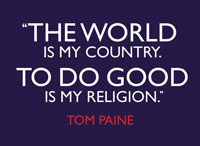 Half of Philosoophy Football is based in Lewes, where Tom Paine lived, worked and wrote. One of this country’s most famous writers, defender of the French revolution, put on trial for sedition in a British court, elected to the republican National Assembly in France. His most famous words are the means to shape humanitéout of horror. “The World is my country. To do Good is my religion.” After Paris these words are our beacon of hope, then and now.
Half of Philosoophy Football is based in Lewes, where Tom Paine lived, worked and wrote. One of this country’s most famous writers, defender of the French revolution, put on trial for sedition in a British court, elected to the republican National Assembly in France. His most famous words are the means to shape humanitéout of horror. “The World is my country. To do Good is my religion.” After Paris these words are our beacon of hope, then and now.Autumn Books for the Corbyn Effect
16.11.2015
Mark Perryman from Philosophy Football provides a rundown of new books for the #jezewecan majority
It would have taken a forecaster of the most extraordinary power to predict in the early days after the General Election when the Labour Right were rampant explaining Labour’s defeat on being too left wing, not Blairist-Brownite enough, that in September Jeremy Corbyn would be Labour leader.
By this time next year there will no doubt be an avalanche of books, some sympathetic, some not, seeking to explain The Corbyn Insurgency. But that doesn’t mean there’s not already an awful lot of decent reads to help shape thinking about this late flowering of Labour as Britain’s new radical left party. One of the best places to start is with an understanding of the widespread disaffection with Westminster Bubble politics. This is what #jezwecan connected to in and around Labour and will need to extend that connection far wider if electoral success is to follow, especially next year in London and Scotland where key elections will be held. Peter Mair’s superb short book Ruling the Void is rightly regarded as the essential text on the subject. It is a tad early to identify where the new thinkingwill come from to provide the basis for the open-ended radicalism that Corbyn promises to become the new face of Labour. But one thing is for sure sticking to good principles isn’t the same as being restricted to old certainties. The brilliant Inventing the Future is testament to that, a post capitalist politics that understands social, economic and cultural change without being seduced by it. But for a single volume to provide both a compelling read and more than enough newl thinking to write the next Labour Manifesto look no further than Paul Mason’s outstanding Postcapitalism: A Guide To Our Future.
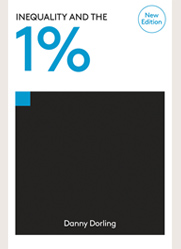 But of course its not enough for a Corbynist Labour Party to promise a better tomorrow, the radical appeal needs to be rooted in improving the here and now too. No writer has done more than Danny Dorling to develop our understanding of the consequences for us all of the inequality that affects some more than others. Two of his classic works of recent years have now been fully revised as post-election editions. Injustice: Why Social Inequality Still Persists and Inequality and the 1% are two essential reads for a politics to make a difference. Nobody likes a tax dodger, closing down tax avoidance is not only the right thing but is just the kind of populist leftism that suits Corbyn's Labour. Gabriel Zucman’s new book The Hidden Wealth of Nations is set to be a key text on one aspect of this, tax havens. More broadly the closest thing yet to what is already being dubbed ‘Corbynomics’ are the ideas of Richard Murphy, prominent campaigner for tax justice. Handily his new, and very accessible for non-economists, book is out with surely the best title of the quarter The Joy of Tax.
But of course its not enough for a Corbynist Labour Party to promise a better tomorrow, the radical appeal needs to be rooted in improving the here and now too. No writer has done more than Danny Dorling to develop our understanding of the consequences for us all of the inequality that affects some more than others. Two of his classic works of recent years have now been fully revised as post-election editions. Injustice: Why Social Inequality Still Persists and Inequality and the 1% are two essential reads for a politics to make a difference. Nobody likes a tax dodger, closing down tax avoidance is not only the right thing but is just the kind of populist leftism that suits Corbyn's Labour. Gabriel Zucman’s new book The Hidden Wealth of Nations is set to be a key text on one aspect of this, tax havens. More broadly the closest thing yet to what is already being dubbed ‘Corbynomics’ are the ideas of Richard Murphy, prominent campaigner for tax justice. Handily his new, and very accessible for non-economists, book is out with surely the best title of the quarter The Joy of Tax.
None of this breathless forward-thinking denies the need to learn from recent efforts towards radical change of varying degrees of success. Andy Beckett’s Promised You A Miracle charts the Left’s failure not only to combat Thatcherism but even to begin to comprehend the challenge its brutal originality posed. Kevin Ovenden provides radical reportage with a style that fizzes with excitement. His first book Syriza: Inside the Labyrinth reveals an important new voice and leaves the reader wanting to know when his next book will be out.
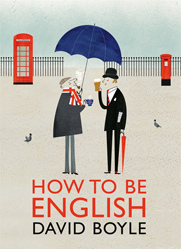 In Scotland a Corbyn effect has already happened, its called the SNP and reduced Scottish Labour to a rump party. There may be some kind of recovery at the 2016 Scottish Parliament elections but unlikely enough to make more than a small dent in Nicola Sturgeon’s hegemonic position representing Scots progressivism. Labour will be forced therefore, willingly or unwillingly, to address ‘The English Question’. Don’t be fooled by the lighthearted tone David Boyle adopts in his magnificent book How To Be English this is a richly incisive book to help address what kind of mix a hegemonic English progressivism might end up looking like. Satnam Virdee’s Racism, Class and the Racialized Outsider is that rare thing nowadays, an academic book that not only engaes with a wider public but also provides a sharp campaigning edge to the analysis. Historical and broad in its coverage this is one of the best accounts of contemporary racisms published in a good long time. If Corbynite Labour is to really challenge the mainstream consensus on immigration Satman provides the kind of thinking necessary fo that vital project.
In Scotland a Corbyn effect has already happened, its called the SNP and reduced Scottish Labour to a rump party. There may be some kind of recovery at the 2016 Scottish Parliament elections but unlikely enough to make more than a small dent in Nicola Sturgeon’s hegemonic position representing Scots progressivism. Labour will be forced therefore, willingly or unwillingly, to address ‘The English Question’. Don’t be fooled by the lighthearted tone David Boyle adopts in his magnificent book How To Be English this is a richly incisive book to help address what kind of mix a hegemonic English progressivism might end up looking like. Satnam Virdee’s Racism, Class and the Racialized Outsider is that rare thing nowadays, an academic book that not only engaes with a wider public but also provides a sharp campaigning edge to the analysis. Historical and broad in its coverage this is one of the best accounts of contemporary racisms published in a good long time. If Corbynite Labour is to really challenge the mainstream consensus on immigration Satman provides the kind of thinking necessary fo that vital project.
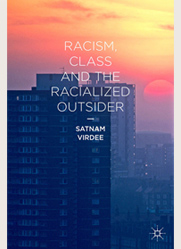 It was no accident that the first ‘test’ Jeremy Corbyn faced was the singing of the National Anthem (sic) at a commemoration of the 75th anniversary of the Battle of Britain. There will be many more such so-called ‘tests’ for him to face between now and a 2020 General Election. More than almost any country English national identity is warped by too close a relationship with both the martial and the imperial. In that mix how WWII is defined is of particular significance. Robert Gildea’s gargantuan account Fighters in the Shadows is one very useful way of appreciating that conflict as an anti-fascist war in which popular resistance played a not inconsiderable role, and the politics of that resistance, in France as well as elsewhere, would often be communism. Not quite how the British Establishment marks these commemorations is it? Fighting On All Fronts edited by Donny Gluckstein magnificently extends this critical point to champion resistance movements of Algeria, Slovakia, Burma and the Philppines as well as internal oppositions in Ireland, Australia, Japan and elsewhere to subvert the traditional means of understanding World War Two without ever losing sight of the essential cause of anti-fascism, then and now.
It was no accident that the first ‘test’ Jeremy Corbyn faced was the singing of the National Anthem (sic) at a commemoration of the 75th anniversary of the Battle of Britain. There will be many more such so-called ‘tests’ for him to face between now and a 2020 General Election. More than almost any country English national identity is warped by too close a relationship with both the martial and the imperial. In that mix how WWII is defined is of particular significance. Robert Gildea’s gargantuan account Fighters in the Shadows is one very useful way of appreciating that conflict as an anti-fascist war in which popular resistance played a not inconsiderable role, and the politics of that resistance, in France as well as elsewhere, would often be communism. Not quite how the British Establishment marks these commemorations is it? Fighting On All Fronts edited by Donny Gluckstein magnificently extends this critical point to champion resistance movements of Algeria, Slovakia, Burma and the Philppines as well as internal oppositions in Ireland, Australia, Japan and elsewhere to subvert the traditional means of understanding World War Two without ever losing sight of the essential cause of anti-fascism, then and now.
Corbynite Labour at its best will combine both a politics framed by new social movements and a process of reclaiming and remaking old traditions and principles of socialist Labour. The recently re-issued From Serfdom to Socialism by Keir Hardie is an excellent starting point for the latter while John Newsinger’s Them and Us is an excellent pocket guide to the momentous period, 1910-1939, in which the British Labour tradition was more or less founded.
But of course the history of the British, and international left, is not restricted to Labourism. It seems more than likely, given his past record, that Jeremy Corbyn will be considerably more open to drawing on these other contributions than any Labour leader of recent times. It will be up to others to choose to creatively reciprocate. The Leadership Election ‘purge’ of thousands who had applied as Labour supporters to vote suggests however that plenty remain prepared to block any such dialogue by means, fair or foul, at their disposal. The journal Twentieth Century Communism provides a regular digest of all that could be good in such a relationship, its latest edition chronicling the imaginative diversity of a political culture framed by communist ideals from France in the 1930s to Germany in the 1960s via music , Eurocommunism and street-fighting protest. From Kirstin Ross Communal Luxury adds to a growing literature which seeks to explore and explain the founding ideals of the Communist vision. Kirstin recounts both the impetus behind the Paris Commune of 1871, a key part of an idealised version of early pre-Soviet communism but also its enduring inspiration today. The towering majesty of what the Communist ideal was once capable of inspiring is superbly captured by Owen Hatherley’s Landscapes of Communism. His book is subtitled as ‘ a history through buildings’ but this is too modest, Owen has pioneered a style of writing that borders on the unique combining well-written travelogue, incisive design commentary and bold politics. A captivatingly unusual mix.
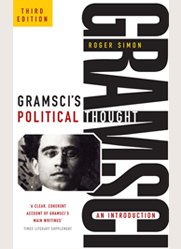 No single thinker has done more than the Italian theorist and writer Antonio Gramsci to influence the case for the continuing relevance of at least parts of an early twentieth century revolutionary tradition. A welcome new edition of Roger Simon’s Gramsci’s Political Thought has just been published, without much doubt the best introduction to Gramsci and excellent timing for the Left revival. Of course support for Corbyn cannot be characterised as crypto-communist, though elements of the media lunatic front will do their worst with such labelling. But the scale of his support and the unique nature of his politics as an elected Labour Leader means the idealistic impulse that he represents to all intents and purposes now occupies a space on the Left so definitively no other formation of any significance is likely to get a look in. So musing over the communist tradition in these circumstances does have some merit. Nicholas Deakin has edited a most interesting collection in this regard, Radiant Illusion? traces the history and experience of middle class recruits to the British Communist Party in the 1930s, a period when Communism, just like Corbyn today, had no serious rivals in terms of radical appeal, and as a result enjoyed significant cross-class support. Not quite the same as the Blairist-Brownite futile hunt for the middle ground still peddled today by the likes of Tristram Hunt and Liz Kendall. Geoff Andrews’ magnificent The Shadow Man covers similar ground while focussing on a single individual, James Klugmann, a key figure in the British Communist Party’s political development both in the inter-war years and post-war too. This is political biography at its best, weaving the individual and the movement they were part of together into a single compelling narrative.
No single thinker has done more than the Italian theorist and writer Antonio Gramsci to influence the case for the continuing relevance of at least parts of an early twentieth century revolutionary tradition. A welcome new edition of Roger Simon’s Gramsci’s Political Thought has just been published, without much doubt the best introduction to Gramsci and excellent timing for the Left revival. Of course support for Corbyn cannot be characterised as crypto-communist, though elements of the media lunatic front will do their worst with such labelling. But the scale of his support and the unique nature of his politics as an elected Labour Leader means the idealistic impulse that he represents to all intents and purposes now occupies a space on the Left so definitively no other formation of any significance is likely to get a look in. So musing over the communist tradition in these circumstances does have some merit. Nicholas Deakin has edited a most interesting collection in this regard, Radiant Illusion? traces the history and experience of middle class recruits to the British Communist Party in the 1930s, a period when Communism, just like Corbyn today, had no serious rivals in terms of radical appeal, and as a result enjoyed significant cross-class support. Not quite the same as the Blairist-Brownite futile hunt for the middle ground still peddled today by the likes of Tristram Hunt and Liz Kendall. Geoff Andrews’ magnificent The Shadow Man covers similar ground while focussing on a single individual, James Klugmann, a key figure in the British Communist Party’s political development both in the inter-war years and post-war too. This is political biography at its best, weaving the individual and the movement they were part of together into a single compelling narrative.
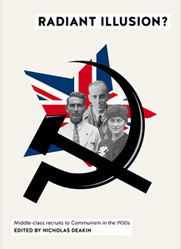 Much of the Marxist Left has never really reoriented since ’89. Battered by fundamental challenges to its most basic principles – Blairism, an Islam of varying versions of militancy, the precariat, civic nationalism, climate change and more – not only losing its appeal but its way too. It is refreshing therefore to read the latest from Neil Davidson, We Cannot Escape From History a writer never shy to polemicise, yet with a turn of political phrase that has the capacity to persuade too. Richly historical, splendidly accessible, this is what good Marxist writing should read like.
Much of the Marxist Left has never really reoriented since ’89. Battered by fundamental challenges to its most basic principles – Blairism, an Islam of varying versions of militancy, the precariat, civic nationalism, climate change and more – not only losing its appeal but its way too. It is refreshing therefore to read the latest from Neil Davidson, We Cannot Escape From History a writer never shy to polemicise, yet with a turn of political phrase that has the capacity to persuade too. Richly historical, splendidly accessible, this is what good Marxist writing should read like.
It is the regular contention of these quarterly reviews that the prerequisite of a radical renewal is the remaking of the political. The success or failure of Jeremy Corbyn won’t be judged by most using this measure yet its long-term viability, and radicalism, will in large part nevertheless depend on its ambition towards this direction. For a model of how the utilitarianism of fast food needn’t be an excuse for poor nutritional value the pocket-sized edition of Leon Lunchbox is an excellent starting point. Of course class is a key determining factor in shaping a nation’s eating patterns but an effective political movement would embrace what we eat and why as a central issue, its too important to be left to the foodies. Gizzi’s Healthy Appetite gives readers an idea of the potential that nutritional recipes can save to inspire in and out of the kitchen.
Remaking the political begins for many by placing parenthood and children at the centre of politics unlike the fringes at best where they, and the issues they are most concerned with, too often find themselves. Jessica Lahey’s The Gift of Failure carefully and sensitively seeks to deconstruct the modern cult of over-parenting towards a childhood founded on the right to take risks and make mistakes. From the Mixed-Up Files of Mrs Basil E. Frankweller and The Secrets of the Wild Wood are two childrens’s books from the ever impressive Pushkin Press who positively celebrate risk-taking, magical or real, as they weave the most marvellous tales around urban and rural wonderlands.
 Of course the best, and most radical, political cultures encourage and empower risk-taking by adults too. Perhaps more than anything else this is what the victory of #jezwecan will enable in and around the Labour Party. There are precious few better symbols of such a practice than the huge growth and popularity of political graffiti, Banksy has a capacity for an exciting intervention around an issue few individual politicians can come close to matching. The reissuing and updating of Roger Berry’s The Writing on the Wall originally published in 1976 is therefore most welcome to give some kind of backhistory. A book of great photos of 1970s political graffiti and the environment out of which it emerged. Michael Rosen’s poetry is perhaps best known for children and young adults, his latest collection Don’t Mention the Children reminds us that whatever the age-group Michael’s combination of wit, passion and idealism is absolutely captivating.
Of course the best, and most radical, political cultures encourage and empower risk-taking by adults too. Perhaps more than anything else this is what the victory of #jezwecan will enable in and around the Labour Party. There are precious few better symbols of such a practice than the huge growth and popularity of political graffiti, Banksy has a capacity for an exciting intervention around an issue few individual politicians can come close to matching. The reissuing and updating of Roger Berry’s The Writing on the Wall originally published in 1976 is therefore most welcome to give some kind of backhistory. A book of great photos of 1970s political graffiti and the environment out of which it emerged. Michael Rosen’s poetry is perhaps best known for children and young adults, his latest collection Don’t Mention the Children reminds us that whatever the age-group Michael’s combination of wit, passion and idealism is absolutely captivating.
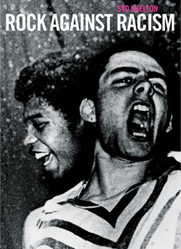 The late 1970s and early 1980s were a kind of high-point for the clash of politics and pop. Elvis Costello, headliner at the second Rock against Racism Carnival in ’78 is an artist whose music has absolutely stood the test of time, his musical journey beautifully recorded via prose just as good as his tunes in his autobiography Unfaithful Music & Disappearing Ink. Elvis Costello, The Clash, Steel Pulse, X-Ray Spex, Misty and Roots, Tom Robinson Band, The Ruts, Sham 69, and more, these were the stalwarts of Rock against Racism, and now given a superb visual history via the Rock against Racism book featuring the work of photographer Syd Shelton. Jeremy Corbyn has already attracted the support of a 2015 range of artists, musicians, poets, film-makers to match the ’78 vintage, the key will be whether such support can be turned into a politics that effortlessly mixes the cultural with the political.
The late 1970s and early 1980s were a kind of high-point for the clash of politics and pop. Elvis Costello, headliner at the second Rock against Racism Carnival in ’78 is an artist whose music has absolutely stood the test of time, his musical journey beautifully recorded via prose just as good as his tunes in his autobiography Unfaithful Music & Disappearing Ink. Elvis Costello, The Clash, Steel Pulse, X-Ray Spex, Misty and Roots, Tom Robinson Band, The Ruts, Sham 69, and more, these were the stalwarts of Rock against Racism, and now given a superb visual history via the Rock against Racism book featuring the work of photographer Syd Shelton. Jeremy Corbyn has already attracted the support of a 2015 range of artists, musicians, poets, film-makers to match the ’78 vintage, the key will be whether such support can be turned into a politics that effortlessly mixes the cultural with the political.
Inklings of what this might look like are provided by two novels. Bernard Wolfe manages to turn the minutiae of Trotsky’s assassination into a powerfully written thriller, The Great Prince Died. Linda Grant revisits more recent history for her novel Upstairs at the Party, the student radicalism of the 1970s.
How to make politics fun? Passion and idealism are not sufficient in themselves to reach much beyond the already committed. A politics that is a pleasure to be a part of, enjoyable and entertaining, the value of a good laugh. There are precious few spaces that combine all that. Any time spent with Mark Thomas certainly will, on TV, live or by reading his new book 100 Acts of Minor Dissent.
 Our book of the quarter combines a similar mix. The most important new voice of comedy and writing of the past few years Bridget Christie, never lets up on her anger while refusing to give ground either to those who cannot bear to see satire be used for committed ends. This is explosive stuff, given an extra edge by an unapologetic feminism still rare in the mainstream. The future face of a political culture worth being a part of? Bridget Christie is absolutely that, her new book A Book For Her a riot of a good read.
Our book of the quarter combines a similar mix. The most important new voice of comedy and writing of the past few years Bridget Christie, never lets up on her anger while refusing to give ground either to those who cannot bear to see satire be used for committed ends. This is explosive stuff, given an extra edge by an unapologetic feminism still rare in the mainstream. The future face of a political culture worth being a part of? Bridget Christie is absolutely that, her new book A Book For Her a riot of a good read.
Note: No links in this review are to Amazon, if you can avoid purchasing from tax-dodgers please do so.
Mark Perryman is the co-founder of the self-styled ‘sporting outfitters of intellectual distinction’, aka Philosophy Football
After 15 Years Philosophyfootball.com Properly Enters the 21st Century
26/10/2015
OK, you can take the clinging to traditional values too far. Philosophy Football began in ’94 founded by two thirtysomethings, Hugh and Mark, already struggling to cope with the rapid march towards all things information-technological. Plus there was no business grand-plan, still isn’t. The idea was simply a Camus T-shirt for family, friends and work mates’ Christmas presents.
So any orders we received were by post with cheque and post order (do they still exist?). Mark’s one-bedroom Tottenham flat was office and store room, the cat leaving footprints on some of the tees, in busy times the bath was turned into extra storage space. Meantime assorted types would help to pack and process the ever-increasing piles of cheques. One has gone on to become a bestselling author, another heads up a well-respected Think Tank and another is now a Professor.
The cheques? There were so many of the damn things to count we single-handedly kept open the TSB Bruce Grove branch for several years, helping to defy British Banking’s policy of closure of non city and town centre branches.
Credit or Debit cards? Yes eventually, that will do nicely. You could phone to order but the web? That just all seemed a bit new but as thirtysomething turned to early forties we thought we should at least give it a go. We let a number of online sites sell the shirts to see how they would sell, and with this all working out decided to take the big step, well it was for us, and set up our own.
Pre-hipsters (neither Hugh or Mark have, or have ever had a beard) we were at the time based in Shoreditch. An old friend of ours was running a social enterprise and introduced us to two exceptionally bright young things , Phil and Paul, who blinded us with geekery but within the space of a few weeks had come up with a site to suit our spec. The ‘look’ was all Hugh’s, how to organise it mainly Mark’s ideas, the technology all down to Phil and Paul.
We wanted it to look ‘clean’, easy to find the shirt you wanted and make a no-frills purchase. And for around a decade it worked, really well, we wouldn’t still be in business if it hadn’t. But around five years ago we realised it was becoming outdated. It didn’t stop people ordering, and the business growing but the site was clunky, lacking even the most basic features, user-unfriendly as we’ve been taught to say.
Philosophy Football prides itself on being small and perfectly-formed. There’s only the three of us, a vast casual workforce on zero-hour contracts do not apply. All there of us are hands-on, if you call or email us one of us will reply not a faceless machine or standardised response. But that has its downside too, what seemed like a major project, a site redesign, kept being put off plus we lacked the skills and knowledge to do it ourselves.
The wonderful people at Clooti Web Design, Elaine and Rachael, came eventually to our rescue. Like us, a small company, they guided us through the process, showing extreme patience with our woeful ignorance of most things technical. And the end result is what you’re now visiting. It’s still our site, clean and simple, advert and pop-up free. We’ve just made it easier to use, with categories, search button, zoom, pictures of related products and the like.
We’ve expanded the editorial content too. This news page will be updated weekly (do come back and visit us again) for daily updates follow us on twitter. You can find out about us, see FAQs asked, contacts us as well. Further afield there’s our youtube page and a flckr page as well. Blimey, it’s 2015 and we’re twenty-first century already!
Here comes the 2015 Summer of Sport
22/06/2015
Mark Perryman reviews the best of this Summer's Sports Books.
English football's Premiership (sic), the best league in the world? The same 4 clubs, well give or take one perhaps, could be jotted down on a scrap of paper every August with a cast-iron guarantee they will fill the Champions League places, year in, year out. Tedium, its the brand value the Premiership has become past masters at providing, yet barely a word of dissent ever breaks through the breathless excitement football's boosterists provide across the print, TV and radio media.
Meantime despite the sportification of society levels of participation in scarcely any form of physical activity continue to rocket downwards. Football, the richest and most high profile of all sports has amongst the sharpest rates of decline in numbers taking part, unless of course we count watching it from the comfort of our own sofa.
Cutting through sport-hype takes a combination of a love for and understanding of sport with a critique of all that it threatens to become. Jules Boykoff is a renowned expert at precisely this kind of combination, his latest book Activism and the Olympics provides a chronicle of activist opposition to the 2010 Vancouver Winter Olympics and London 2012. Andrew Zimbalist does something similar over a longer timeframe, and taking in both the Olympics and Football World Cups. His conclusions in his book Circus Maximus are devastating, the socio-economic benefits of hosting are next to negligible and more often than not actually negative. Yet despite almost every pledge made by London 2012 remaining unfulfilled as Rio 2016 approaches the self-satisfied bandwagon that the Olympics has turned into will steamroll almost all critical voices into the margins. Perhaps what is needed to resist is the kind of ideological rigour that features amongst those profiled in the pioneering collection Sport and Revolutionaries edited by John Nauright and David Wiggins. Lenin and Che Guevara, who would have imagined the centrality they both gave sport and physical culture in the cause of human liberation? Or likewise social movements spanning Irish Republicanism, the overthrow of colonial regimes, anti-racism and civil rights. Each in their own ways , as essays in this excellent book recount, saw the importance of sport towards their ends. Two pleas though to an otherwise excellent publisher, Routledge. Why only the high-priced hardback edition limiting the sale to libraries? And why the standard, one-design-fits-all cover ? Both factors will seriously reduce the potential popular impact of what is an important book.
Getting to grips with the enduring absence of a social, economic, political and cultural dimension of too much mainstream sportswriting is vital to any kind of appreciation of how sport is consumed. If is only via this kind of project that recreation and leisure will become framed by the contribution it makes towards human liberation rather than simply consumed as a big screen extravaganza. Roger Domenghetti's superlative From the Back Page to the Front Room provides an unrivalled account of the evolution of football's monopoly of the sports media, with interviews and insights that are both informative and compelling. Jamie Cleland provides something similar, if more wide-ranging, in A Sociology of Football in a Global Context. This is a textbook study of the new football, ranging over almost every subject the serious student of the game might want to consider. Same publishers as Sport and Revolutionaries so same two pleas apply! Hugo Borst's O, Louis is a supreme example of how sportswriting can capture the cultural and the social at its best without any negative impact on its ability to reach and engage with a mass audience. Van Gaal, despite his modest first season at Man Utd, remains set to be one of the great characters of English football for some time to come. His foreignness, his Dutchness, every bit as intriguing as Wenger and Mourinho's otherness, if not yet framed by the same degree of success.
A Matter of Life and Death by Jim White is an alternative history of football told via 100 quotations' from 'There is Great Noise in the City' describing 1314 street football to World Cup 2014. Jim White is a great sportswriter, he has chosen his quotes carefully while providing his own informative yet idiosyncratic narrative. Brilliant! But words alone, however well-written, can never entirely capture the appeal of football. Edited by Reuel Golden Age of Innocence is a combination of the very best world photography of football in the 1970s with a skilfully written set of introductory commentaries about the decade. Age of Innocence? This is domestic football both before the Premiership but also prior to the Bradford Fire, Heysel and Hillsborough too. Three very different events but each in their own way defining football in the 1980s. A book of global reach too, the world of football depicted as much less of a corporate enterprise than it is now.
But how to push at the boundaries of the limited meaning that modern corporatised football has become? Firstly breakdown its gendering. A process that has accelerated in the twenty-first century, from lets say the near non-existent to the painfully slow. Events recorded very well in the new book by Carrie Dunn and Joanna Welford, Football and the FA Women's Super League (Oh dear though another academic publisher producing books with a standard and boring cover design, and high-priced hardback library edition, why?). Second, confront and expose the corruption in the administration of the global game. Heidi Blake and Jonathan Calvert's The Ugly Game investigates in breathtaking detail the sheer magnitude of the corruption at the highest levels of FIFA. Third, provide practical examples of what an alternative might look like. Rather confusingly also titled The Ugly Game Martin Calladine's book is a very welcome pioneering effort to do just that. Fourth, dump the ridiculous rhetoric embraced by fans as well as the corporate brand managers, that the Premiership is 'the best league in the world'. It's the richest yes, but in almost every other regard it is inferior to several others, most notably the German Bundesliga. Read Ronald Reng's very good Matchdays to find out how German football gets by without foreign owners, clubs 51% owned by their fans, mainly German players on the pitch, drinking and standing on the terraces. Didn't that use to be 'the English way' when Liverpool, Notts Forest and Villa won European Cups and an England side could make to it to a World Cup semi-final. All pre-Premiership no thankyou very much.
Few football books manage to provide the breadth and dept of insight with the very obvious passion for the game that Mark Doidge combines in writing Football Italia. From the country of Gramsci, Mussolini,post-war Eurocommunism, Berlusconi and more it is no surprise that Italian football also is a game of extremes. What Mark Doidge manages, definitively, to explain is how a nation's football can never be divorced from how a national culture has been shaped too, all with a neat line in understanding why sometimes despite that process Italian football retains a fateful appeal for fans the world over.
It is only in English football's ever-shortening summertime off-season that much of any other sport gets any kind of look in. And even that is reduced in a year of a World Cup or a Euro. For a fortnight or so the media will go overboard for the tennis at Wimbledon. Such coverage aided when the rivalry that singles tennis generates reaches out beyond the strawberries and Pimms brigade. Peter Bodo's account,Ashe vs Connors records just such a moment from the faraway summer of 1975. This is sports writing as social history against the backdrop of towering personalities and supreme talent, all the makings of a really good sports book.
An Ashes Summer used to more or less guarantee a mass audience for cricket. But since the appallingly short-sighted decision of cricket's governing body to dump free-to-air live TV coverage interest has plummeted and is unlikely ever to recover, despite what looks like a fast-improving England team. In his newly published autobiographyCurtly Ambrose provides a compelling picture of the heights of popularity Test cricket once enjoyed. A thrilling West Indies team becoming a symbol of resistance, diaspora and nationhood. This was international sport at its very best, fiercely competitive, individuals combining for the common purpose of the team, imagined communities acquiring some semblance of the real. Will we see the like of it on a cricket pitch again? Possibly not. Rob Smyth like Jim White uses 100 quotations to track a sport's history. This time, The Ashes inGentlemen and Sledgers. Rob depicts the changes from the pre TV era, the broadening popularity of cricket via television and radio coverage, England's return to glory in recent years and then the catastrophic decline on the pitch accompanied by the loss of terrestrial TV coverage. Despite all this the 5-day 5-test Ashes series remained throughout one of the most epic contests in the world of sport and Rob's book helps us to appreciate the reasons why.
It is only in recent years that Le Tour has featured very much at all as part of the Great British sporting summer. In the era that William Fotheringham described in his classic biography of Italian cycling great Fausto Coppi Fallen Angel the 1940s and 1950s cycling up mountains was something best left to continental types. And the domestic popularity of cycling hadn't changed so very much by the time of his latest biography, the greatest French cyclist Bernard Hinault in the late 1970s and early 1980s. But it is by reading William's books the latter-day domestic popularity of this most extraordinary drama of human endurance can begin to be accounted for. Alpe D'Huez by Peter Cossins accounts for the kind of physical achievement Grand Tour cycling represents via the challenge of just one epic mountain these cyclists are expected to climb on their two wheels. The greatest climb? Quite possibly, though the greatness perhaps lies in the realisation that for these cyclists once they have done one day's climbing another follows, and another, with next to no respite. It is a sport that borders on the inhuman, the biggest single reason for the scourge of performance enhancing drugs that for a while threatened to engulf cycling. Yet with dedication these climbs, or something like them, can be done. This is the dream of the sporting everyman, or increasingly everywoman too. Ian McGregor's To Hell on a Bike rather brilliantly tells just such a tale, an ordinary cyclist who trains himself to tackle Paris-Roubaix, widely regarded as the toughest of all the one-day classic cycle races.
Two Days in Yorkshire by Peter Cossins and Andrew Enton superbly captures with stunning photography and great prose the sheer magnitude of what Le Tour starting in Yorkshire in 2014 came to represent. An unforgettable experience and one that deserves to be remembered as far more important than London 2012 in terms of its possibilities for reshaping English sporting culture. Rick Robson's beautiful book, De Tour De Yorkshire again combines photos and prose, this time to point towards the kind of legacy Le Tour might yet leave behind. Showcasing Yorkshire as England's capital destination for cyclists, to race or for pleasure and all points in-between.
The thrill of physical activity, recreational or competitive, for many is not only to maintain a decent level of fitness but to test what our bodies might be capable of. Natural Born Heroes by Christopher McDougall gives the active reader something to aim towards, an approach to ultra-fitness that is almost philosophical in its gritty determination to inspire ever greater achievements of endurance. This is thriller-writing for fitness junkies. Adharanand Finn achieves something similar in his new book The Way of the Runner a gripping account of the place of marathon running in Japanese sporting culture. If all these sounds a bit macho read Lucy Fry's Run, Ride, Sink or Swim, more than enough to reassure that both sexes are almost equally susceptible to the kind of physical obsession that can drive some in search of the very limits of our body's potential.
Our sports book of the quarter? Opportunities to play sport, any sport at any level are inevitably socially constructed. The failure to understand this both narrows the scope of most mainstream sportswriting and at the same time ensures most writers on politics to wilfully ignore sport. Gabriel Kuhn is an author who would never make either of these cardinal errors. His Playing As If The World Mattered is an illustrated history of sport as activism. Refusing to treat one as the opposite of the other Gabriel weaves together stories and episodes, some familiar, many not, to portray sport as a vital space for and method of human liberation. The writing is effortlessly informative and inspiring while the full colour illustrations do a similar job visually. Together this is a truly great book to savour for a better future as well as to read now to help improve the present, on or off the pitch, track , inside and outside the ring or pool,wherever your sporting fancy takes you.
Note No links in this are to Amazon if you can avoiud the offshore tax dodgers please do so.
Mark Perryman is the co-founder of Philosophy Football.
A manifesto of good reads
10/04/2015
Mark Perryman of Philosophy Football selects his reading for the 2015 General Election Campaign
The much-missed indie band, well by some of us of a certain age, Sultans of Ping, had a great line in one of their barnstormer numbers "I like your manifesto, put it to the test 'tho." We are told in all seriousness that this is the most important General Election, ever, yet it will be fought between the three parties of the mainstream with ever-decreasing differences in their politics. Most important? Not in those terms, the importance lies almost entirely in the busting apart of the Westminster cartel, the centre this time really won't hold.
Veteran rebel, aka 1960s 'street fighting man' ,Tariq Ali proves the durability of a countercultural idealism. Tariq's new book Extreme Centre is a splendid denunciation of the battle for the middle ground and never mind the rest of us. After Neoliberalism? and its companion volume The Neoliberal Crisis are both framed by a similar 1968-inflected politics to Tariq Ali's. A shared belief that another politics is not only necessary but possible. As the dull grey reality of #GE2015 threatens to smother any lingering hope these are essential reads. An optimism of the intellect revived by a new wave of writers, thinkers and activists too. Owen Jones is nothing short of a phenomenon, someone from the left who can brighten up the dullest of TV studio debates , a wilful energy to inspire that is founded on good writing. His latest, The Establishment is more than enough to convince anyone of the maxim 'whoever we vote for the government always gets in." Naomi Klein first made her name as a hugely influential figure in the early twenty-first century movements of global resistance with her innovative book No Logo. Naomi's This Changes Everything shows every sign of making a similar impact, this time to refresh and renew a Climate Change movement that desperately needs to find a form of politics to catapult the issue to the very top of any pile of governmental priorities. The #GE2015 campaign goes to show just how far we still have to go to achieve that vital ambition.
The best contemporary writer on the plight of urban Britain is without a shadow of a doubt the sublimely gifted Owen Hatherley. His recent A New Kind of Bleak could almost be a guidebook to the communities that barely merit a mention in any General Election Campaign. This is the Britain of deindustrialised disconnection, not the handful of swing marginals that matter infinitely more to the politicians and their spinners. Two more books provide an essential politico-travelogue through this other Britain. Mary O'Hara's Austerity Bites. is reportage from the sharp end of the poverty and inequality divide. While from James Meek a new edition of his superb Private Island. The elegantly polemical writing just what you would expect from a London Review of Books irregular
In the swing marginals that our neo-rotten borough political system elevates to such central importance and more or less sod the rest the General Election campaign will be decisively shaped by race defined almost entirely by the issue of immigration. What British politics desperately needs is the kind of understanding of nationhood that Yasmin Alibhai-Brown provides in her latest book Exotic England. Not only do we have UKiP dragging the entire discourse on immigration dramatically to the Right, but Labour has proved singularly incapable of articulating a vision of the virtues of a multicultural society, and the extra-parliamentary anti-racist campaigns neither have much of a popular dimension nor are willing to engage with any kind of project for a progressive, pluralist Englishness. Yasmin shows in her beautifully written book how all three elements of this recipe for a social disaster have an inadequate understanding of race and nation.
There will be much asking of the question, why are young people so disengaged with politics? The question of course should be asked the other way round, why is so much of politics disengaged with the young? There are of course exceptions, and these tell us plenty about the degeneration of the political. Norman Finkelstein graphically describes in Method and Madness the horrors that Israel has successively inflicted on Palestine. It is a subject that mobilises the passion of tens of thousands on occasion, many are young, yet where will any denunciation of Israel feature in the General Election campaign. With honourable, and few, exceptions, nowhere. It will be the same by and large with the near universal absence of voices that are pro-trade union rather than indulging in the simplified vocabulary of 'trade union barons'. Dave Smith and Phil Chamberlain's astonishing book Blacklisted combines investigative journalism with campaigning politics to reveal where such an absence will leave us. The bullying, harassment and spying on of workers who stand up for basic rights to organise.
An early critic of the profound weaknesses of Parliamentary Socialism was of course Ralph Miliband. Weaknesses accelerated during the period when his two sons came to prominence as MPs. Handily republished just in time for Ed's campaign Class War Conservatismreminds us of the superbly polemical analysis his father once provided. An essential antidote to Labour's 2015 Manifesto. Miliband senior was of course an unapologetic Marxist, his work characterised by the creative application of theory to practice. He was part of an era when varied, sometimes conflicting , versions of creative Marxism flourished, dominated in particular by the interest in the work of Antonio Gramsci. It is most welcome therefore that a new collection of freshly translated and interpreted work by Gramsci has been published, The Pre-Prison Letters, 1908-1926. It is rarely remarked upon but a deadly combination of technocratic managerialism with marketisation and the meekest of resistance to both has led to the more or less wholesale elimination of any sort of popular political intervention of much note by academics outside of their university sinecures. David Graeber is not only a welcome exception to this sorry situation but in his new bookThe Utopia of Rules he furiously yet effectively critiques the culture of top-heavy bureaucracy . Should the absence of public and radical intellectuals matter? Read the superb History on Our Side by Hywel Francis for the most convincing of arguments why it does. Mixing labour history and political theory in the context of the 1984-85 Miners Strike Hywel's writing epitomises the kind of work that helps to shape communities of interest out of struggle. The most fitting of memoirs to this most epic of industrial disputes.
Of course nobody in their right minds would suggest that movements for change will be the same today as those that fought that battle for Coal not Dole a generation ago. Two recent books give us the beginnings of an insight into how the terrain of what it means to be radical has changed. Clive Bloom's Riot City provides a much-needed theoretical backdrop to the upsurge in inner-city direct action. Of different varieties certainly, the student tuition fee protests, Occupy London, the Summer 2011 riots, but each affected by the same punitive clampdown, and each in their different ways seeking to force the subject of change on to an agenda that wilfully ignores such demands. Sroja Popovic and Matthew Miller's Blueprint for Revolutionhas a more internationalist flavour yet combines this with something altogether rare, a practical methodology for revolutionary change.
What British politics so singularly lacks right now is the capacity to inspire. When this does happens it electrifies portions of the electorate otherwise untouched by the Westminster Bubble. This helps explain the Green Surge and the irresistible post-referendum rise of the SNP. Neither the success of the Greens nor the SNP fit any pre-existing model of an Outside Left. In part this is because the resources of hope that do exist have become detached as much from the organised Left as organised politics. The appeal of Woody Guthrie, revisited in the splendidly illustrated Woody Guthrie and the Dustbowl Ballads has a certain timelessness which means it is never entirely extinguished, it is in the undergrowth of popular music that a return to the political is beginning to re-emerge that can't be entirely separated from Woody's legacy. But at the same time it is just as likely to be influenced by the single most important political figure of inspiration of the modern era, Banksy. Yes a graffiti artist and sometime filmmaker has single-handedly reinvented the radical appeal of the situationists with a popular reach few traditional political figures come anywhere close to matching. Banksy's work has been superbly chronicled in a new collection This is not a Photo Opportunity which goes out of its way to place his work in this political, oppositional context.
Nobody would ever claim the Soviet Union made any mistake in recognising the political role of art. The wonderfully titled CCCP (Cosmic Communist Constructions Photographed) is the perfect coffee table book for unrepentant Marxists. The mix of the beautiful and the brutal in Soviet era architecture beautifully restored to former glories in the pages of this book before decay and disinvestment threaten their disappearance. The very well-edited journal Twentieth Century Communism is the best single source of an up-to-date historiography of this social movement that so decisively shaped the last century. The latest edition ranges over Communist organisation in Brittany, family and sex in the Chilean Communist Youth of the Allende era, and Scandinavian Communists. Or for another episode from the margins of history read a new account of American Maoism and its peculiar impact on the protest movements of the USA in the 1970s and 1980s. Heavy Radicals provides a rare insight into the motivations and political culture of a fringe culture on the American Left.
The two most decisive twentieth century global events whose legacy continues to shape the twenty-first century however are surely the First and Second World Wars. At the end of April the centenary of Gallipoli will be marked, the 1915 campaign most represented by the contribution of Australian and New Zealand troops (ANZAC). From Australia a brilliant effort by left wing scholars and writers to understand the impact of this era on today, What's Wrong with ANZAC? It is an urgent necessity for the British Left to produce a similarly popular, sometimes unpopular, intervention on the shaping of our own martial history. Chris Bambery's The Second World War: A Marxist History is a fine indication of the potential for such a project, but we need more of this and across the entire left and radical spectrum.
But how do we propel this uncovering of the meaning of the past into the everyday? There is no finer, more imaginative exponent of this vital yet difficult task than the pioneering David Rosenberg. A long-standing activist and writer who has reinvented himself as a guide and organiser of radical history walking tours of London. A brilliant idea, combining tourism and pleasure, exercise and history, fun and the odd tea or beer stop. David has now compiled these routes into a guidebook, Rebel Footprints though for the 'real' experience why not join him for a walk, details on his website East End Walks A history workshop of the streets? Its something every city and town should surely have if any kind of left culture is ever to be rebuilt in this country.
It is the practical entrepreneurship of East End Walks that so impresses me. History, walking, tourism these are everyday experiences that touch millions, merge them with the political and the radical and the potential is obvious. No other human activity however dominates and shapes popular culture right now in the way cooking does. It is a very soft version of multiculturalism to promote the consumption of curry as a symbol of diversity but in the near total absence of any kind of effective movement against racism we should be grateful at least for the opportunities created when such connections are made. Meera Sodha's Made in India Cooked in Britain gets her essential point across in what she has rather brilliantly called her cookbook. Inside, treat yourself to beautiful food photography, splendidly scrumptious recipes and without once labouring the point a powerful symbolism of what a modern Britain eats, likes and most of us, UKiP and the other parties demonising immigration notwithstanding, wouldn't have it any other way no thankyou very much.
Engaging with issues of parenthood and childhood more than almost any other subject reshapes what we mean by the political. The failure to do so narrows not only the relevance of politics but its appeal too, to join or to vote. It Runs in The Family by Frida Berrigan is a powerful testament to both the strengths and weaknesses of a radicalised, liberatarian-socialist politics that puts the conduct of relationships, parenting and children at its very core. The personal is political? Well if it isn't what exactly is politics for, or more sharply for whom? Lydia Syson is one author who would have no problem answering that question. A hugely popular writer of teen novels, Lydia's latest Liberty's Fire combines the Paris Commune, love and friendship for a thrilling and passionate plot perfect for the teenager in your life. There are precious few modern authors for this age-group with the appeal and ideals of Lydia Syson. However Pushkin Press are past masters at finding classic childrens tales of an earlier era and repackaging them for today's teen audience, their latest releases include Eric Kastner, best known for his anti-fascist Emil and the Detectives , and his 1931 classic tale of Berlin night-time scrapes Dot & Anton.
Of course the anything-but-idle appeal to our imagination is an essential pre-requisite for plenty of grown-ups too in their search for inspiration beyond the terrain of the everyday and the mainstream. Few British writers have done more to provide this over the past two decades than NIck Hornby. His latest, Funny Girl continues his rich mix of wry humour, neat period observational detail and an unravelling of the predicaments of British masculinity to create a damn good read. Mikhail Elizarov's The Librarian is another foreign language gem discovered by Pushkin Press, this time for adults. Soviet era propaganda versus dissent from below, wrapped around a hugely imaginative plot that loses nothing in translation. Or for an an absolute classic read Victor Serge's recently republished Midnight in the Century.A tale of revolutionary ideals perverted by absolute power, the necessity to resist and the enduring subversive power of hope.Chris Brookmyre fulfils Val McDermid's recent claim that most crime fiction is left-wing. I've been a huge fan of Christopher Brookmyre for years, a guilty pleasure if ever there was one. But Val's excellent piece helps validate this fascination with the violent criminal underworld of his writing, including the thrilling twist and turns of his latest, Dead Girl Walking. Like others of his ilk the crime is merely the plot around which witty and critical social observation is cast, and in Chris's case given the additional political sharpness of an unashamed Scottishness too.
And our book of the quarter? The effortlessly feminist writing, the radically egalitarian, the anti-establishment wit, the natural greenery ofGet it Together by Zoe Williams would add up to a good read at any time. But during this election campaign it like a resuscitation device for the demoralised and disaffected. Labour should read this and weep as they wonder why a decent chunk of it doesn't appear anywhere near their manifesto. In easily digestible chapters Zoe dismantles the consensus politics of the same-old-same with a blistering dissection of the hypocrisy and ineffectiveness that holds it together. Carefully researched this is no empty polemic but the kind of politics that Labour's lost millions hanker after and more often than before find here and there. From a bit of Green, a touch of SNP, a dash of Plaid Cymru, and the odd maverick Labour candidate who has slipped through the party machinery net too for good measure. 'Get It Together' is Zoe's rallying cry in the final chapter, with a matter of weeks to go not too much chance of that this time round but the disorganised Left could yet find itself on the winning side as the perviously impregnable party blocs shake, shatter and fail to poll. This is the book to treat ourselves to as we prepare for the great reckoning to come and the shape of whatever might follow. Brilliant, and funny too, what a rare mix.
Note<No Links in this book review to Amazon, if you can avoid the tax dodger please do so.
Mark Perryman is the co-founder of the self-styled 'sporting outfitters of intellectual distinction', aka Philosophy Football.
- The Death of Innocence
27.12.25 - Thatcherism Today
04.10.25 - Top Ten Books to Understand Labour Conference
26.09.25
